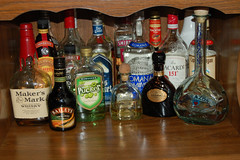Depression and alcohol, a mood disorder and an addictive substance – these two things are always linked together. There are many accounts and statements, which point to the idea that alcohol leads to depression and depression, on the other hand, also intensifies alcoholism. However, the big question is, how did these two things really get related? The following statements briefly discuss the connections between the two.
Depression and Alcohol – a Dangerous Combination
One of the principal reasons why depression and alcohol are closely associated with each other is that the two complement one another in creating one vicious scenario – suicide.
Alcohol causes a person to lose his or her inhibitions. A person under alcoholic influence becomes aggressive and is capable of doing violent acts. If, by any chance, that person has depression and is contemplating of committing suicide, alcohol might just be the “push” that he or she needs before the plan is transformed into an action.
Suicide is a fatal decision, and depressed and alcoholic individuals who are at their wit’s end do not recognize that what they are about to do is against moral and societal virtues. According to the American Foundation for Suicide Prevention, an organization committed to the prevention of suicide, more than 60% of individuals who died by suicide have suffered from major depression. In addition, 30% of all completed suicides have alcohol as one of the factors that influenced the successful performance of the brutal act. Evidently, alcoholism and depression increases the risk for suicide of an individual suffering from depression.
Depression and Alcohol Lead to Bigger Problems
Depression and Alcohol produce an additive effect; both greatly increase each other’s negative outcome. For instance, a depressed person who takes alcohol becomes more depressed because alcohol is a depressant if taken in large amounts. The same is true with alcoholics; the more they depend on alcohol, the more chances that they’ll end up being depressed.
Considering this additive effect, depression and alcohol then can also lead to several other serious problems such as physical health problems, decrease in work performance, social isolation, relationship issues, family problems, anxiety, emotional instabilities, and sleep disturbances.
Depression and Alcohol Treatment: A Call to Action
The treatment for Depression and Alcohol problems is a combination of different treatment modalities, which all require some degree of cooperation and support to become successful. Depression symptoms can be addressed properly by using therapeutic drugs (primarily antidepressants) and psychological assistance such as counseling, behavioral, and cognitive therapies.
On the other hand, alcoholism or alcohol dependence can be managed through physical detoxification and by using invaluable human resources such as asking the help of a counselor, a good friend, or a trusted family member. Joining Alcoholics Anonymous (AA) is also a very promising option.
Depressed alcoholics should bear in mind that treating their abnormal mood state and excessive compulsion to drink alcohol would need a great deal of sacrifice. Nevertheless, the first and foremost step in achieving freedom from Depression and Alcohol is actually acknowledging that a problem in relation to this actually exists.
The moment that the afflicted person acknowledges his or her vulnerability - it makes the treatment process of eradicating depression and alcohol a lot easier.
Related articles
- Overcoming Depression and Alcoholism (everydayhealth.com)
- Alcohol and Depression (everydayhealth.com)
- Depression and Substance Abuse (everydayhealth.com)

No comments:
Post a Comment